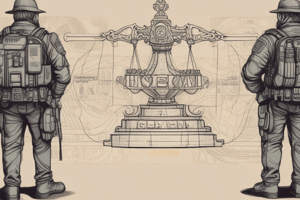Podcast
Questions and Answers
Match the following judicial system objectives with their definitions:
Match the following judicial system objectives with their definitions:
Fairness = Ensure equal treatment under the law for all individuals. Deterrence = Discourage criminal behavior by imposing appropriate consequences. Restoration = Focus on restoring victims and community harmony. Rehabilitation = Aim to reform offenders to prevent future crimes.
Match the following law enforcement roles with their descriptions:
Match the following law enforcement roles with their descriptions:
Crime Prevention = Proactively work to prevent crime through community engagement. Investigation = Gather evidence, conduct interviews, and follow leads to solve crimes. Arrest = Apprehend suspects based on probable cause or warrants. Community Relations = Build trust and cooperation with the community.
Match the following corrections and rehabilitation methods with their purposes:
Match the following corrections and rehabilitation methods with their purposes:
Incarceration = Confine offenders in prisons or jails as a form of punishment. Rehabilitation Programs = Offer educational, vocational, and therapeutic services. Probation and Parole = Supervise offenders in the community as an alternative to incarceration. Restorative Justice = Involve victims and offenders in dialogue to promote healing.
Match the following criminal justice ethics principles with their explanations:
Match the following criminal justice ethics principles with their explanations:
Match the following public safety limits with their implications:
Match the following public safety limits with their implications:
Match the following ethics concepts with their definitions:
Match the following ethics concepts with their definitions:
Match the following objectives of the judicial system with their benefits:
Match the following objectives of the judicial system with their benefits:
Match the following law enforcement activities with their goals:
Match the following law enforcement activities with their goals:
Match the following concepts of rehabilitation with their strategies:
Match the following concepts of rehabilitation with their strategies:
Match the following challenges in public safety with their consequences:
Match the following challenges in public safety with their consequences:
Flashcards are hidden until you start studying
Study Notes
Judicial System Objectives
- Fairness: Ensure equal treatment under the law for all individuals.
- Justice: Deliver just outcomes through impartial adjudication of cases.
- Deterrence: Discourage criminal behavior by imposing appropriate consequences.
- Rehabilitation: Aim to reform offenders to prevent future crimes.
- Restoration: Focus on restoring victims and community harmony.
Law Enforcement Roles
- Crime Prevention: Proactively work to prevent crime through community engagement and visibility.
- Investigation: Gather evidence, conduct interviews, and follow leads to solve crimes.
- Arrest: Apprehend suspects based on probable cause or warrants.
- Enforcement: Uphold laws and maintain public order through patrolling and responding to incidents.
- Community Relations: Build trust and cooperation with the community to enhance public safety.
Corrections And Rehabilitation
- Incarceration: Confine offenders in prisons or jails as a form of punishment.
- Probation and Parole: Supervise offenders in the community as an alternative to incarceration.
- Rehabilitation Programs: Offer educational, vocational, and therapeutic services to support reintegration.
- Restorative Justice: Involve victims and offenders in dialogue to promote healing and accountability.
Criminal Justice Ethics
- Integrity: Uphold honesty and transparency in all actions and decisions.
- Accountability: Hold individuals and organizations responsible for their actions.
- Confidentiality: Protect sensitive information related to investigations and personal data.
- Impartiality: Ensure neutrality and avoid conflicts of interest in decision-making.
- Community Responsibility: Acknowledge the role of justice professionals in advocating for social justice.
Public Safety Limits
- Resource Constraints: Limited funding and personnel can hinder effectiveness.
- Legal Boundaries: Must operate within the confines of the law, including constitutional rights.
- Community Trust: Excessive force or misconduct can erode public confidence in law enforcement.
- Balancing Act: Weighing public safety needs against individual rights and freedoms.
- Policy Limitations: Restrictions imposed by policies or laws that can affect operational capabilities.
Judicial System Objectives
- Fairness ensures equal treatment for all individuals, maintaining trust in the judicial process.
- Justice aims for impartial adjudication, delivering just outcomes based on evidence and law.
- Deterrence discourages crime by imposing consequences, aiming to prevent future offenses.
- Rehabilitation focuses on reforming offenders to facilitate their reintegration into society.
- Restoration emphasizes healing for victims and restoring community harmony following crime.
Law Enforcement Roles
- Crime prevention involves community engagement to proactively reduce crime rates.
- Investigation includes gathering evidence, conducting interviews, and following leads to solve cases.
- Arrests are made based on probable cause or warrants, facilitating the judicial process.
- Enforcement maintains public order through vigilant patrolling and immediate incident response.
- Building community relations fosters trust and cooperation, crucial for effective law enforcement.
Corrections And Rehabilitation
- Incarceration serves as punishment, confining offenders in secure facilities.
- Probation and parole provide community supervision, offering alternatives to incarceration.
- Rehabilitation programs aim to educate and equip offenders with skills for reintegration into society.
- Restorative justice practices create space for dialogue between victims and offenders, promoting healing.
Criminal Justice Ethics
- Integrity is vital for ensuring honesty and transparency in all judicial and law enforcement actions.
- Accountability holds individuals and organizations responsible for their practices and decisions.
- Confidentiality protects sensitive investigation details and personal information of individuals involved.
- Impartiality is crucial, aiming for neutrality and avoiding conflicts of interest throughout the judicial process.
- Community responsibility highlights the duty of justice professionals to advocate for and uphold social justice.
Public Safety Limits
- Resource constraints limit effectiveness due to insufficient funding and personnel to meet demands.
- Legal boundaries ensure operations are within constitutional rights, protecting individual freedoms.
- Community trust can be severely impacted by excessive force or law enforcement misconduct.
- The balancing act is essential in weighing public safety against individual rights and freedoms.
- Policy limitations may restrict operational capabilities, affecting the overall effectiveness of law enforcement.
Studying That Suits You
Use AI to generate personalized quizzes and flashcards to suit your learning preferences.




